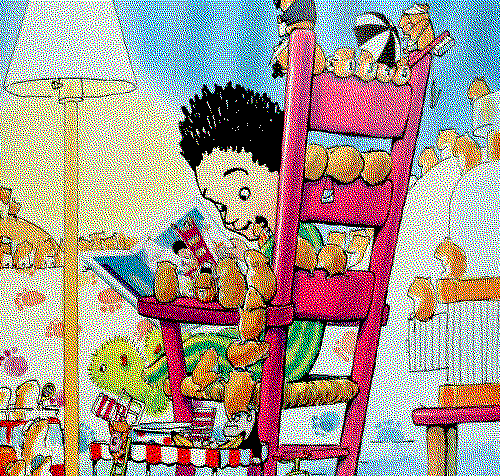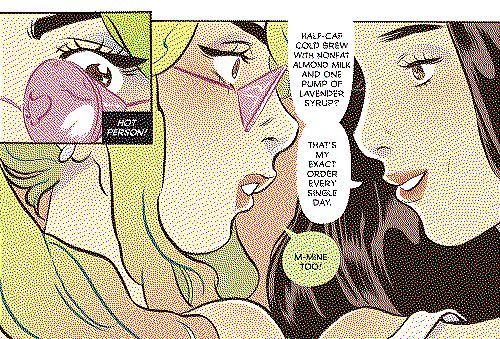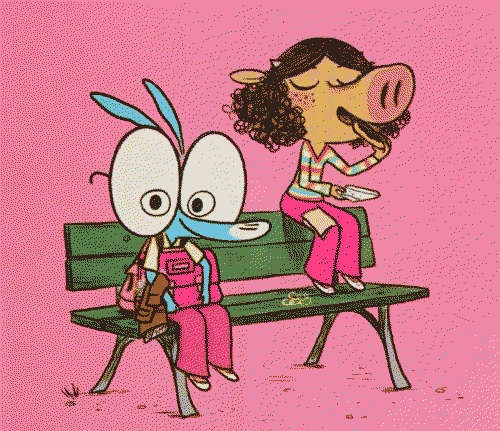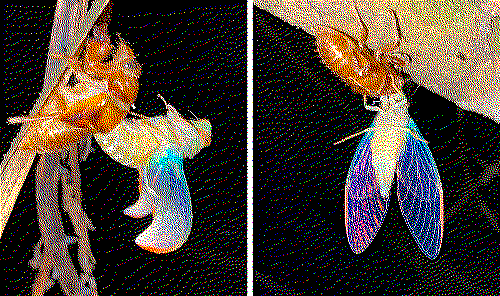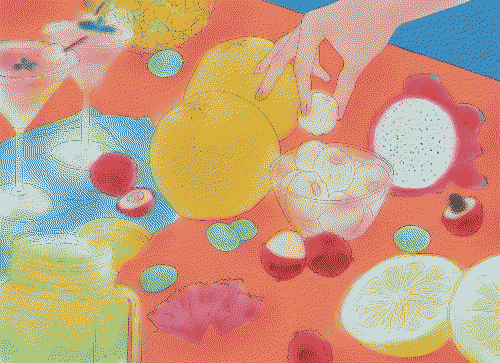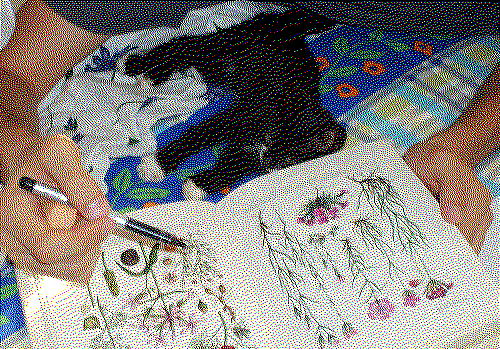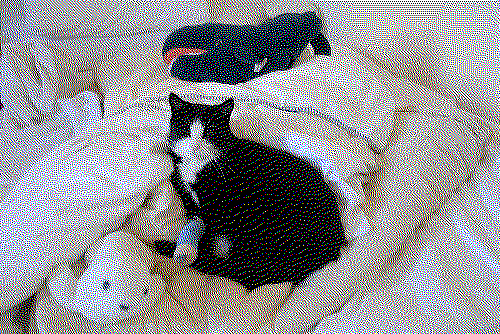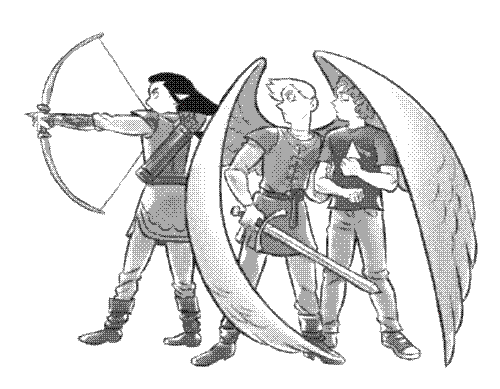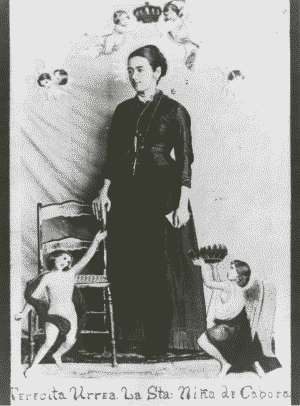return / home / go to newest
Here I am. A dead girl talking to a dying one. What fun. Nasima scratched one barnacled ear. It's just us awake right now. Us and the nightmares. They go hunting at this hour.
Hunting?
They eat stories. That's what they're made of. Now sleep, Nasima said, and kissed Firuzeh's cheek, her lips as slickly soft as kelp.
★
You'll need me Firuzeh. Wait and see.
They were both quiet then. The whispering of the distant sea hung like a bright diamond in each of their ears.
I hate this place, Firuzeh said. I won't miss it at all.
That sounds about right.
But tonight, it's almost beautiful.
Moonlight washed the gnawed coral pinnacles, frosted the skeletal phosphate cranes, and drenched the canvas tents where a hundred dreamers dreamed gray, grim, and miserable dreams. The sky was salted with stares.
Nasima said, there's something about beginnings and endings. That polishes them so smooth you can nearly see your face in them. Then you open you hands and let them go, and the current pulls you onward and away, behind you, those stones sink down to the mid, where no one will ever find them again.
(... expand)
This year's clown was an Afghan boy with floppy hair that fell in his eyes and a smile as sweet as canned peaches on a plate [...]
"Your turn, Nour. Keep playing–don't stop!"
"My sis-ter. Is af-raid of. Her sha-dow. And friends."
★
Nour said: But he was fine.
He was. At night, he could see the Milky Way and the stars that made serpents and peacocks and hares. He pitched a shelter of eucalypt bark, and day after day he shot his bow. It was lonely, since he had no one else. And then he heard that his family was dead.
★
I heard you screaming in your dreams, so I walked to you across the sea.
Everyone has nightmares–
Coral cut my feet. Whales swallowed me. But fine, this isn't a nightmare. You don't need me.
★
Nasima was sitting on top of the television, saltwater trailing from her heals in two lines down the glass.
Oh don't ignore me Firuzeh. I'm trying to help. You didn't have nightmares last night, did you? That's because of me. [...]
No, I didn't have any nightmares last night.
That's good, Abay said as the tomatoes crackled in the pan, oblivious to the dead girl atop the TV.
That's because I tore them to pieces with my teeth[...]
― E. Lily Yu, On Fragile Waves
And so you came to my house on the soft pads of a midwinter kitten, the whisper of your black tresses sweeping your heels, and so you came to my heart just as quietly. Why, then, did you make such a terrible noise when you let go of my hand and departed, a great trumpeting of horns, a great beating of drums?”
― Nghi Vo, When the Tiger Came Down the Mountain
It’s a testament to Gerwig’s singular earnestness—a level of sincerity unavailable to many of us—that using Barbie to affirm the worth of ordinary women feels, to her, quasi religious. [...] “I remember feeling so safe in that and feeling so, like, enough.” She imagines people going to the temple of the movies to see “Barbie” on a hot summer day, sitting in the air-conditioned dark, feeling transported, laughing, maybe crying, and then coming out into the bright heat. “I want people to feel like I did at Shabbat dinner,” she said.
“I want them to get blessed.”
― Greta Gerwig's Barbie Dream Job
“Even though the child was by now too old for it, she bathed her as if she were a baby, dousing her in the enameled tub with water scented with jasmine and basil, rubbing her with a sponge, soaping her meticulously without missing the least chink of ear or foot, massaging her with cologne and powdering her with a swan's-down puff, and brushing her hair with infinite patience, until it was as soft and shiny as an underwater plant.
She dressed her, put her to bed, brought her breakfast on a tray, and forced her to drink linden tea for her nerves, camomile for her stomach, lemon for translucent skin, rue for bile, and mint for her breath, until the child became a beautiful, angelic being who walked through the halls and patios wrapped in a scent of flowers, a rustling of starched petticoats, and a halo of curls and ribbons.”
― Isabel Allende, The House of the Spirits
Rain finally came + it's beautifully cool. Wonder how long it will last. It was marvelous because it started suddenly and then was alternately terrific and gentle.
I think of you all the time and therefor have little to say that would not embarrass you, for instance my first feeling about the rain was that it was like you.
― John Cage, The Selected Letters of John Cage
They moved in a hunting lope, a stride that covered ground, even when the ground was the uncertain footing of sand. Their shoulders rocked forward with each step; powerful, heavily muscled. There were two. They had not come with an escort. Mahit's first impression was of black-keratin claws on their hands, of terribly long and flexible necks that ended in muzzled heads, round ears that were faintly furred.
― Arkady Martine, A Desolation Called Peace
In front of that massive army, a figure waited on horseback. His armor swallowed the light, glimmering only on its sharp edges. His looped braids were like a moth's opened wings. And behind him the ghosts, standing between himself and his front line like an army of the dead. The eunuch general.
(+ click for more)
The tall bandit lunged at Monk Zhu. Yuchun, who had closed his eyes at the last moment, opened them and stared in astonishment at two bodies locked not in violence, but a fe rocious embrace. Monk Zhu's face was shining with joy as he reached up and took the back of the tall bandit's head into the palm of his hand, a possessive gesture that aligned strangely with their relative sizes. "Big brother."
★
Ma's hope was like seeing the world through the iridescent wing of an insect: a glowing, soft- edged version of itself in which the arc of history could still trend towards kindness and decency. Ma always felt so much, and with such a foolish, beautiful intensity, that witnessing her emotions made Zhu's own internal landscape seem as barren as a cracked lake bed.
Silence closes round the space you leave
but in the sea below, unheard,
a teeming of krill,
the flutings of seals,
the flick and darting of fish
through slow spun tendrils
of whale song.
― Elizabeth Lewis Williams, Erebus
Instead of Drashtr, her fingers plunged into a field of filaments. Wiry. Tickling. Kicking between her fingers.
That’s not Drashtr!
The danseur has already emerged.
Talli stands breathless, taking in the beauty of him.
Like a little . . . god,
she thinks.
Incorporating Aki’s “donated” mechules, Drashtr’s new body is larger.
Size of a big cat. Still, he stands on four crablike legs. But the mushroom
cap, once his whole body, is now something more akin to hips. Centaur-
like, a humanoid torso springs from these hips, though it bears four
segmented arms and no distinguishable head. Hundreds of tiny limbs
project from “chest” and “abdomen.” Like the limbs or antennae of shrimp.
Talli realizes that they are what she touched in the dark. A few limbs are as
thick around as a wedding band. Others seem thinner than hair. Most, she
notes, display exotic protrusions, like toy surgical tools. A few are tipped
with familiar, poppy seed eyes. Those of the old Drashtr.
Yet it is Drashtr’s new colours that widen Talli’s eyes. Hundredfold hues
drift across skin and chitin, across every millimeter of his form. They’re
like fast clouds. Flocks of parrots. Vivid as blood. Sun. He is alternately
awash and feathered in constant colour.
And quite lovely.
And bowing.
To me?
― Sean Qitsualik-Tinsley and Rachel Qitsualik-Tinsley, Taaqtumi, An Anthology of Arctic Horror Stories
But perhaps in compensation for the physical dimensions of the land, which became more pregnable the farther down its length we traveled, the plant life grew wilder and denser, so that the forest pushed all the way to the very edge of its earth, and the water surrounding it was covered with a busily kaleidoscopic skin of its leavings – wind-tattered hibiscus flowers and sunburned mango leaves, hard little nuts of unripe guavas and scraps of ferns – so thick that you felt for a minute frightened of the jungle, its voracious appetite and ambition, its hunger to consume every surface it encountered.
― Hanya Yanagihara, The People in the Trees
Shells were falling on the ridge nearby and bullets were slicing leaves, but Reynolds sat astride the horse in a motionless calm, looking out toward the fight, picture of a soldier, painted against the trees. Reynolds called in one of his officers. He said slowly, somewhat delicately, pronouncing each word in turn, evenly, machinelike, [...]
― Michael Shaara, The Killer Angels
Some astronauts report experiencing the “overview effect,” a sense of mental clarity and connectedness to humankind that overcomes them when they look down at Earth from space. I feel that on a cellular level when I pick up a mangosteen, a celestial-purple orb with a flower-stem hat. It looks as if it were conceived for a Miyazaki film, its proportions so cutesy that it demands to be anthropomorphized. Inside are pillowy white segments, oneiric in texture and taste, with notes of pineapple, strawberry, lychee and your most carefree memory of childhood. The experience is no less expansive than seeing the ocean or hearing a Chopin nocturne for the first time. You catch yourself wondering what else this world has been hiding, what staggering beauty it’s capable of.
– Tracy Wan, Try New Fruit. The Weirder, the Better.
It was I, your lammergeier daughter,
who devoured your bones–look, Father,
how they slide down my throat like rifles.
– Pascale Petit, The Lammergeier Daughter
Animal femurs
ascribed to saints who never
existed, are still
more holy than portraits
of conquerors who,
unfortunately, did.
– W.H. Auden, Marginalia
"I want to sit with our friends for another couple minutes," she said, pointing to the giraffes. "And with you." Saying that, she scooted closer to me and rested her head on my shoulder. I was too flustered, too suddenly dizzy to say anything back, so I just let her head rest there. The giraffe that had been lying there still was, lazily blinking his eyes open and closed. Its great neck curled like some alien punctuation.
– Kaveh Akbar, Martyr
Abisola shifted and Dania got in beside her. They lay side by side for a moment, staring at the ceiling. Then Dania contorted so that her head was touching Abisola's shoulder, warm breath tickling her cool arm. Abisola breathed out all her tension and focused on the point of contact, skin on skin. She closed her eyes. She slept.
★
A wind blew and ruffled the trees, the branches whispered a prayer, the springs gurgled a song.
"Isn't it fantastic that they don't mix?" His voice was soft, the kind of soft that comes before or after tears. "I just wanted you kids to look at this marvel and feel a tenth of my awe. They don't mix! What a wonder. Isn't this a wonder?"
Abisola felt a wash of gratitude for his presence an echo of her parents, whom she would soon be reunited with, wrapped within, different from, but connected to. She listened to the springs coexisting side by side, retaining their own virtues, stubbornly separate at their meeting but gliding forward together, bracing each other, bound forever. "It is," she agreed.
– Pemi Aguda, Ghostroots, "The Wonders of the World"
When Elliot woke up that morning, he was comfortably warm, which was excellent. Luke was bothering him about something, which was not.
Luke kept yammering at him to wake up right now, but there didn't seem to be a battle or a literary dispute or anything too urgent going on, so Elliot continued snoozing. He was really warm, for the one of the first times in the Borderlands, where the weather was worse than England and the heating situation was medieval. The blankets felt heavy and warm as down, and when Elliot cracked an eye open he saw the tent arched above him, gold and shining. Except the tent was not gold.
Elliot opened his eyes.
There was no need for alarm. The tent had not magically transformed into a golden dome overnight. The tent was simply filled with wings. The idea sounded scary, as if Elliot had been enveloped in a storm of birds, but the reality was anything but. The moment was quiet, the wings motionless and serene, even the sounds of the outside world muffled. The wings, gold-touched pearl like those of Caroline the Fair from long ago, caught the light filtering in through the fabric of the tent. They turned into bright gilt arches which were, somehow, soft and warm and alive.
Elliot reached up a hand and ran his fingers lightly, very lightly, down the radiant row of feathers.
"Elliot," Luke said, sounding as if he were holding onto the fraying edge of the robe of Patience. "Do not touch them!"
Which was when Elliot was forcibly reminded that these living wings belonged to a living person, and his behavior was completely terrible. He snatched his hand back and, in a move that would have surprised absolutely no one who had ever met him, began to babble.
Fortunately, Elliot babbling was normal enough behavior that it actually seemed to calm Luke down. Luke worked out how to fold his wings back up, and Elliot only made one joke containing the words "morning wing" which was restraint, because he'd thought of forty-seven.
– Sarah Reese Brennan, In Other Lands
Two horses were standing at the side of the causeway, nose to tail, pressed together for warmth. As she ran by one of them pricked its ears and neighed, and a moment later they both came trotting after her. For a quarter-mile or so they kept up with her. Then they stopped, their curiosity at an end, and she ran on alone.
– Sylvia Townsend Warner, The Corner That Held Them (click for more quotes)
So memory pulls us forward, so prophecy is only brilliant memory–there will be a garden where all of us as one child will sleep in our mother Eve, hooped in her ribs and staved by her spine.
★
We sat at a hot green metal table, weather-dulled and sticky, and loud black flies with rainbows in their wings fed at the pools of drying ice cream and then scrubbed their maws meticulously with their forelegs, like house cats.
*
I knew what the silence meant, and so did she. It meant that on an evening so calm, so iridescently blue, so full of the chink and chafe of insects and fat old dogs dragging their chains and belling in the neighbors' dooryards–in such a boundless and luminous evening, we would feel our proximity with our finer senses. As, for example, one of two, lying still in a dark room, knows when the other is awake.
– Marilynne Robinson, Housekeeping
The world is indifferent to the repuatations of men. Beneath the veil of civilization the truth prowls on an older earth (p. 145).
(... expand)
Apparitor started to shake her, wide-eyed and furious, that pale freckled face of his high with blood-color. He smelled of fresh laundry. (p. 29)
"Are we tyrants?" Baru sliced her mango. The blade snicked against the plate; the texture was too much like flesh. Her chest hurt. (p. 36)
The marines of her detachment spill ashore in a silent leaping swarm. Like the nymphs of some redsteel crustacean grown smooth and armored on the secret metals of the deep (p. 143).
– Seth Dickinson, The Monster Baru Cormorant
